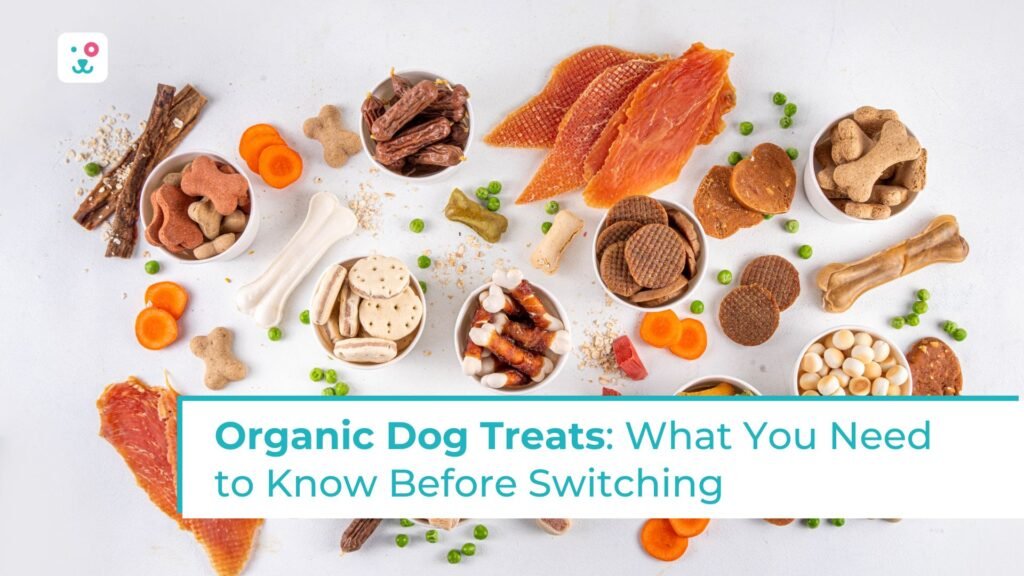As a devoted dog owner, you’re always on the lookout for ways to improve your furry friend’s health and happiness. One area that’s gained significant attention in recent years is nutrition, particularly when it comes to treats. Organic dog treats have become increasingly popular, but what exactly are they, and are they worth the switch? In this comprehensive guide, we’ll explore everything you need to know about organic treats for dogs.
What Are Organic Dog Treats?
Before diving into the benefits and considerations of organic dog treats, it’s essential to understand what sets them apart from conventional options.
Organic dog treats are made from ingredients that have been produced without the use of:
- Synthetic pesticides
- Chemical fertilizers
- Genetically modified organisms (GMOs)
- Artificial preservatives, colors, or flavors
The Rise of Organic Dog Treats
The growing popularity of this mirrors the increasing consumer interest in organic products for human consumption. Pet owners are becoming more conscious of what goes into their dogs’ bodies, driving demand for healthier, more natural options—Things you need to know before buying dog food.
Why Are Pet Owners Choosing Organic?
- Health concerns: Many pet owners worry about the long-term effects of artificial ingredients and pesticides on their dogs’ health.
- Environmental awareness: Organic farming practices are generally more sustainable and environmentally friendly.
- Allergies and sensitivities: Some dogs may have fewer adverse reactions to organic treats compared to conventional options.
Benefits of Organic Dog Treats
Switching to organic dog treats can offer several potential benefits for your furry friend. Let’s explore some of the most significant advantages:

1. Higher Nutritional Value
Organic dog treats are often made with whole food ingredients that retain more of their natural nutrients. This can lead to:
- Improved overall health
- Better digestion
- Stronger immune system
- Healthier skin and coat
2. Fewer Artificial Additives
All natural organic dog treats typically contain no artificial preservatives, colors, or flavors. This reduction in synthetic additives can be beneficial for dogs, especially those with sensitivities or allergies.
3. No Pesticide Residues
Organic ingredients are grown without the use of synthetic pesticides, reducing the risk of harmful chemical residues in your dog’s treats.
4. Higher Quality Protein Sources
For treats containing animal products, organic options often use meat from animals raised without growth hormones or routine antibiotics, potentially providing a higher quality protein source.
Considerations Before Switching to Organic Dog Treats
While these treats offer many potential benefits, there are several factors to consider before making the switch:
1. Cost
Organic dog treats are often more expensive than conventional options due to higher production costs and stricter regulations. Consider whether the potential benefits align with your budget.
2. Availability
While organic treats for dogs are becoming more common, they may not be as widely available as conventional treats. You might need to shop at specialty pet stores or online to find a good selection.
3. Palatability
Some dogs may be picky eaters and might not immediately take to the taste or texture of organic treats. You may need to experiment with different brands or flavors to find ones your dog enjoys.
4. Calorie Content
Remember that organic doesn’t necessarily mean low-calorie. Be mindful of portion sizes to prevent overfeeding, especially if you’re using treats for training purposes.
Popular Types of Organic Dog Treats
The market for organic dog treats has expanded significantly, offering a wide variety of options to suit different preferences and dietary needs.

1. Baked Biscuits
These classic treats come in various flavors and are often made with organic whole grains, fruits, and vegetables.
2. Freeze-Dried Meat Treats
Made from single-ingredient organic meats, these treats are high in protein and very palatable for most dogs.
3. Dental Chews
Organic dental chews help promote oral health while satisfying your dog’s urge to chew.
4. Training Treats
Small, low-calorie organic treats are perfect for use during training sessions.
Organic Dog Treats and Special Dietary Needs
For dogs with special dietary requirements, organic treats can be particularly beneficial. Here are some scenarios where organic options might be especially helpful:
Allergies and Sensitivities
Dogs with food allergies or sensitivities may benefit from the limited, natural ingredients found in organic treats. Look for single-ingredient treats or those made with novel proteins your dog hasn’t been exposed to before.
Weight Management
While organic doesn’t automatically mean low-calorie, many organic treats are made with whole food ingredients that can be more satisfying in smaller portions. Look for low-fat options like dehydrated sweet potato chips or carrot sticks.
Senior Dogs
Older dogs may benefit from organic treats that support joint health or cognitive function. Look for treats containing ingredients like organic glucosamine or omega-3 fatty acids.
Puppies
Growing puppies need high-quality nutrition, and organic treats can be a great supplement to their diet. Look for treats that are appropriately sized for puppies and support healthy growth and development. Also Read – 6 Benefits of Feeding Your Pup With All-Natural Dog Food
The Impact of Organic Dog Treats on Overall Health
While treats should never make up more than 10% of your dog’s daily caloric intake, choosing organic options can contribute to your pet’s overall health and wellbeing. Here’s how:
- Improved Digestion: The whole food ingredients in organic treats are often easier for dogs to digest.
- Better Skin and Coat Health: Natural ingredients rich in essential fatty acids can promote a shiny coat and healthy skin.
- Increased Energy: High-quality, nutrient-dense treats can contribute to better overall energy levels.
- Dental Health: Some organic treats are designed to promote dental health by reducing plaque and tartar buildup.
Conclusion: Are Organic Dog Treats Right for Your Pet?
Deciding whether to switch to organic dog treats is a personal choice that depends on various factors, including your dog’s health needs, your budget, and your personal values.
The most important factors in your dog’s nutrition are their main meals and overall calorie intake. If you’re considering making significant changes to your dog’s diet, including switching to organic treats, it’s always a good idea to consult with your veterinarian first.

